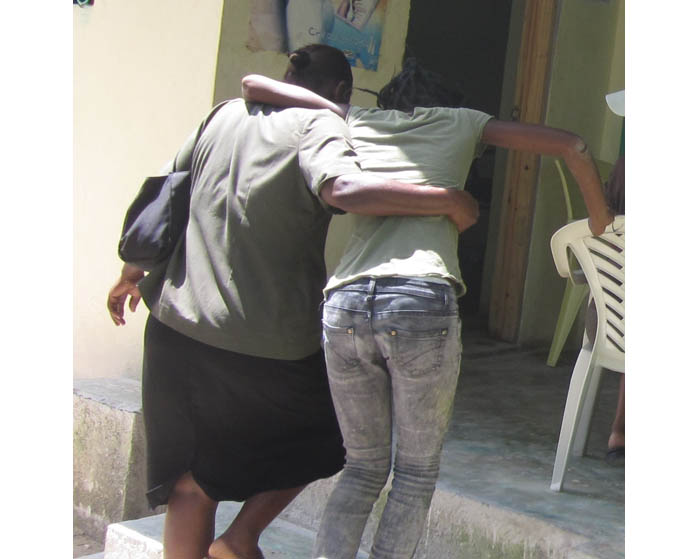

Reducing violence against women in Haiti

The young Haitian stumbled into the offices of the women’s organization in Saint-Marc, half-carried by her mother. She had just been severely beaten by a male cousin who, in a rage, had punched her repeatedly in the face before casting her headlong into a ravine. She could barely walk.
“The cases of violence in this area are legion,” says the Charline, coordinator for the Organisation Fanm Charèt (OFC), who ran to meet the latest victim of assaults on Haiti’s women.
Reported cases of gender-based violence have risen sharply in the last ten years; OFC sees up to five cases of physical or sexual violence every week. One of five women’s organizations supported by the MDG-Fund, the center offers psychological care and legal assistance to victims of assault, and has served more than 80 women in less than seven months.
Haiti, the poorest nation in the western hemisphere, struggled with violence even before the trauma and dislocation of the 2010 earthquake brought fresh tensions to already strained communities. Between 2002 and 2008, for example, the reported number of rapes grew almost 2000 % from 57 cases to 1192. Though possibly reflecting a greater willingness of victims to come forward rather than an absolute increase in rapes, the need for services is great.
To combat gender-based violence, the MDG-Fund is financing a joint UN programme to help understand where and why violence is occurring and to create targeted responses for each of the five cities in the project area.
With the State University of Haiti, the joint programme is supporting the National Observatory on Violence and Crime to collect and provide reliable data on violence and criminality in the country. As part of an integrated response, it is also strengthening the ability of women’s organizations like OFC – as well as health clinics and camps for people displaced by the earthquake – to counsel and care for victims of violence through material assistance as well as technical support provided by UN Women.
To help tackle the drivers of violence, the programme is leading large awareness-raising campaigns, providing conflict management skills for youth, training community leaders on violence and conflicts and the causes of violence and helping create socio-economic opportunities for vulnerable women, at-risk youth and people with disabilities to increase their economic independence.
The work is part of the MDG-F’s efforts to help countries like Haiti to reach the anti-poverty Millennium Development Goals, including reducing conflict, improving gender equality, empowering women and combatting the violence that many suffer.
To coincide with the November 25th observance of the International Day for the Elimination of Violence Against Women, the joint programme in Haiti trained 27 local leaders to help spread awareness about domestic violence within their communities. It also published a comic book teaching that domestic violence is a crime punishable by the law, and encouraging its victims to seek medical help within three days and to report the crime to authorities.
One of the comic’s central themes is that communities have a crucial role to play in preventing such violence from happening and that they should not tolerate or ignore domestic violence.
Charline at OFC, who has six staff members and a budget to conduct violence-reduction training sessions, says she is determined to invest even more in prevention and behavior change at the community level. "The problem,” she says, “is rooted in the minds of men.”
****************************************************************************************************
The joint UN programme“Conflict Prevention and Social Cohesion through Local Community Empowerment and Institutional Capacity Building” is a collaboration between UNFPA, UNESCO, IOM, UNDP, UN Women and government ministries, local authorities and civil society organizations.